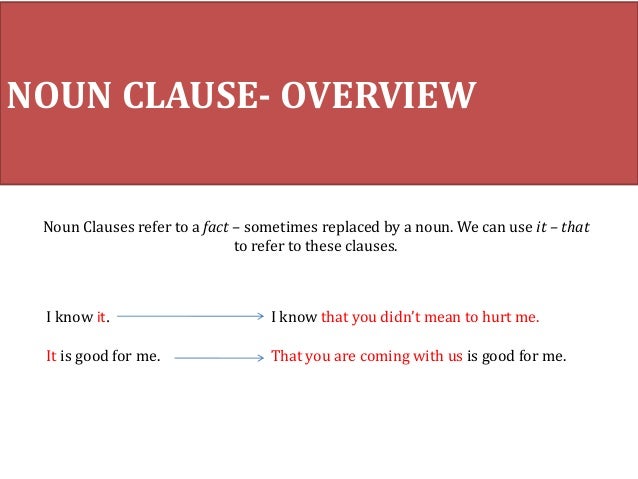What Is A Noun Clause | Fill in the blanks with an appropriate subordinating conjunction. A noun clause is a dependent clause that acts as a noun. Whatever you decide to do is fine with me. As you diagram the following sentences, start by deciding what the noun clause is acting as. I believe that he is innocent.
Fill in the blanks with an appropriate subordinating conjunction. A noun clause can act as the subject or object of the verb in the main clause. Adjective complements often provide a reason why someone or something is a certain way. Simply put, a noun clause is a dependent clause that takes the place of a noun in the sentence. Since a noun clause is a noun, it can function as a subject of a sentence.

A noun clause can act as the subject or object of the verb in the main clause. The noun clause acts as the object of the preposition. I know what the answer is. Jan 30, 2018 · noun clause:. Whether he will attend or not. Noun clauses can act as subjects, direct objects, indirect objects, predicate nominatives, or objects of a preposition. Whatever you decide to do is fine with me. What i had forgotten was that i had a test today. How you made that decision baffles me. A noun clause may be used as a subject or direct object of the verb, as a predicate noun, as object of the preposition, or as an appositive. Noun clauses begin with words such as how, that, what, whatever, when, where, whether, which, whichever, who, whoever, whom, whomever, and why. Here are a few noun clause sentences where the noun clause is the subject of the sentence. I believe that he is innocent.
What i had forgotten was that i had a test today. Whatever you decide to do is fine with me. I believe that he is innocent. Noun clauses begin with words such as how, that, what, whatever, when, where, whether, which, whichever, who, whoever, whom, whomever, and why. Jul 27, 2021 · the term "noun clause" might sound confusing, but finding and identifying one is much easier than you might think.

A dependent clause is a phrase that can't stand on its own as a complete sentence. Since a noun clause is a noun, it can function as a subject of a sentence. Noun clauses begin with words such as how, that, what, whatever, when, where, whether, which, whichever, who, whoever, whom, whomever, and why. As you diagram the following sentences, start by deciding what the noun clause is acting as. It can be used as the subject, direct object, indirect object, object of a preposition, subject complement, or appositive. Whatever you decide to do is fine with me. Fill in the blanks with an appropriate subordinating conjunction. I know what the answer is. Noun clauses can act as subjects, direct objects, indirect objects, predicate nominatives, or objects of a preposition. It can also act as the object of a preposition. Here the noun clause 'that the traitor should be put to death' is that object of the verb ordered. Here the noun clause 'that he would not go' is the object of the verb said. A noun clause can act as the subject or object of the verb in the main clause.
Connect the sentence diagram to the independent clause with a little forked line. Adjective complements often provide a reason why someone or something is a certain way. Underline the noun clause in each sentence. I believe that he is innocent. Here the noun clause 'that the traitor should be put to death' is that object of the verb ordered.

It can also act as the object of a preposition. Noun clause as a subject. It can be used as the subject, direct object, indirect object, object of a preposition, subject complement, or appositive. Adjective complements often provide a reason why someone or something is a certain way. Noun clauses can act as subjects, direct objects, indirect objects, predicate nominatives, or objects of a preposition. I believe that he is innocent. Whatever you decide to do is fine with me. Underline the noun clause in each sentence. Jul 27, 2021 · the term "noun clause" might sound confusing, but finding and identifying one is much easier than you might think. As you diagram the following sentences, start by deciding what the noun clause is acting as. Jan 30, 2018 · noun clause:. = subject complement of 'uncertainty' describing what is uncertain noun clauses can play the role of an adjective complement. Simply put, a noun clause is a dependent clause that takes the place of a noun in the sentence.
What Is A Noun Clause: A dependent clause is a phrase that can't stand on its own as a complete sentence.
comment 0 Post a Comment
more_vert